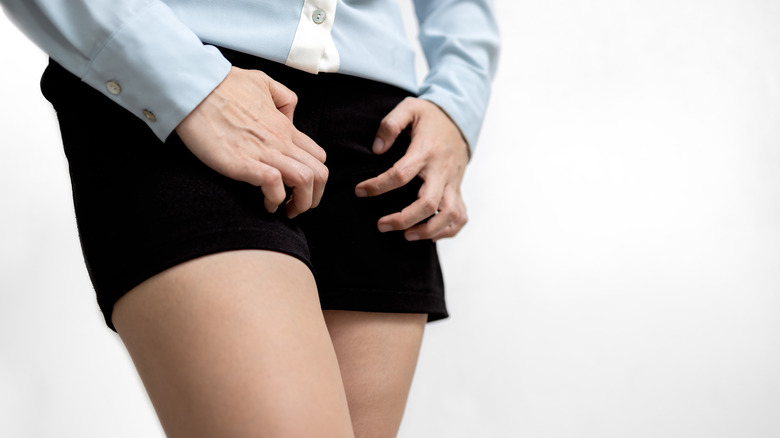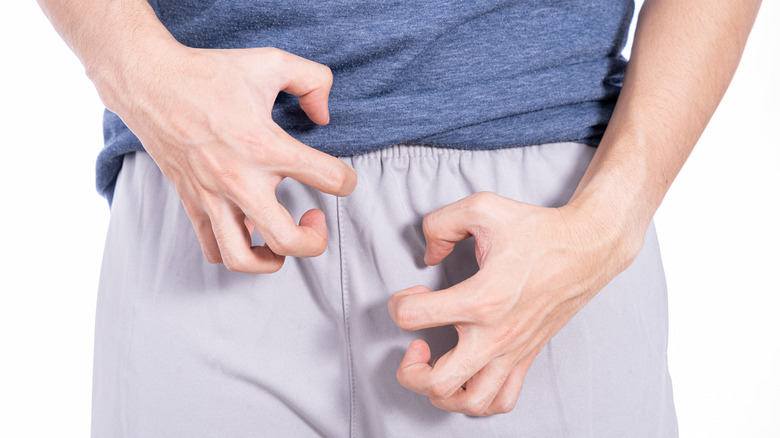What It Really Means When Your Crotch Itches
Is there anything more uncomfortable or embarrassing than feeling the need to scratch an itch in an intimate part of your body? Whether you're at work, a social function, or relaxing at home, itchy genitals are anything but pleasant. When it comes to an itchy crotch, there's no discrimination, as everyone is potentially susceptible to a prickly intimate area, says Cleveland Clinic. Sometimes taking preventative measures can protect you from experiencing itchy genitals, but if you're in the thick of it, then knowing the cause and how to treat your symptoms are both key.
Some causes of a scratchy crotch can be related to sexually transmitted diseases (STDs), while other itchy sensations may be rooted in allergies or an overgrowth of bacteria or yeast (per Cleveland Clinic). No matter the cause, you'll probably want the itch to go away ASAP, so here's what you should know about what it really means when your crotch itches.
Itchy culprits everyone can experience
There are many causes of an itchy crotch that can affect everyone. Several STDs, including genital herpes, gonorrhea, chlamydia, and genital warts, can include an itchy crotch as a symptom (via MedicalNewsToday). Trichomoniasis is another common STD that can irritate your intimate regions. For women, trichomoniasis can result in vaginal sensations like burning, soreness, irritation, redness, and, of course, itchiness. For men, the same STD can create pain, irritation, and itchiness inside the penis. Trichomoniasis can lead to painful urination and abnormal discharge for both women and men.
Wearing tight clothing, especially in weather that is on the warmer side, can lead to bacterial and yeast growth that can result in an itchy crotch, reports Verywell Health. Using scented soaps, fragrances, or any other type of aromatic product in your private parts can lead to irritation, allergic reactions, or provoke the onset of other conditions like a yeast infection, so it's best to stick with unscented products when it comes to your intimate area. Additionally, shaving your pubic hair can lead to an itchy crotch (per Healthline). When it comes to grooming below the waist, not using enough shaving cream or lubricant when you shave, shaving too often or too quickly, and not changing out your razor regularly can lead to itchy razor burn and irritation. Skin conditions like eczema and psoriasis can also affect your genital area and create an itchy crotch.
Sex-specific causes of itchy crotch
Your biological sex can make you susceptible to specific causes of an itchy crotch. For males, you may experience tinea cruris, otherwise known as jock itch, says Mayo Clinic. This fungal infection can result in a very itchy, red rash that appears around your genitals, groin, and inner thighs. Sometimes the rash is half-moon or ring-shaped, and small blisters can form its outline, or the skin may be scaly or flaky. Jock itch can come about if you sweat a lot (especially during summer months), if you're overweight, or if you frequently work out. Since jock itch usually isn't a serious condition, it can be treated by keeping the affected area clean, dry, and using a topical antifungal cream.
If you're female, then an itchy vaginal area may indicate that you have a yeast infection, per Healthline. In addition to your intimate area being extremely itchy, symptoms of yeast infections include thick, white vaginal discharge similar to cottage cheese, red or irritated skin around your vaginal area, and painful urination. Yeast infections can be caused by hormonal imbalances around your menstrual cycle, being under stress, taking antibiotics (which kill the bacteria that keeps your vagina healthy), or by wearing wet or sweaty clothing. During the summer when the weather is hot and humid, you may be at increased risk of an overgrowth of yeast in your vaginal area. Always make an appointment with your doctor rather than try to treat a yeast infection yourself.
Preventing an itchy crotch
What are the best ways to ward off an itchy crotch? Avoiding tight clothing, especially during exercise or other times when you'll be sweating, is one of the best preventions for itchy genitals, according to Cleveland Clinic. Instead, try to stick with loose cotton or natural-fiber clothing, or go without underwear for a period of time. Changing your underwear at least every 24 hours is vital. During summer months when the weather is hot and humid, especially when lounging poolside or surfing the waves at the beach, make it a priority to change out of your wet swimsuit as quickly as possible.
You should also be mindful when it comes to fragrances, and that's not just about the products you use in your intimate area. Be aware of how much laundry detergent you're using when you wash your clothes, and try to go with scent-free detergents when you can (per Cleveland Clinic). Make certain that all of the detergent has rinsed out after washing.




